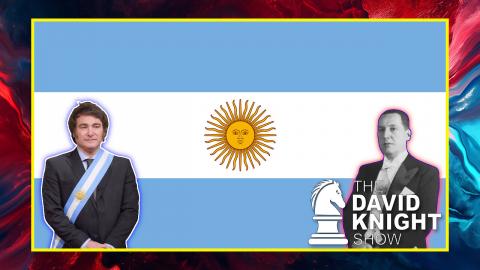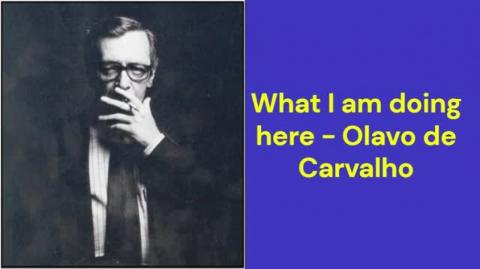The Socialism of the Rich (Olavo de Carvalho)
The Socialism of the Rich
Every political discussion or choice is grounded in values, criteria, and mental frameworks that have already been disseminated within the surrounding culture. Electoral politics is like a ship that must navigate by the waves around it: with skill, it can cross them to reach its destination, but it cannot alter or affect them in the slightest. It must reckon with them as givens of reality. Culture is the sea in which the ship of partisan politics either sails, drifts, or sinks. Cultural action is vastly more complex, far-reaching, and long-term than political action. Politics may ride its wave to advantage or disadvantage, but it cannot alter the course of culture, which predetermines it and limits the horizon of its possibilities.
The entire strategy of the Gramscian “cultural revolution” rests on these obvious and irrefutable principles. In truth, Stalin himself had already perceived and put them into practice even before Gramsci. For any leftist activist, these principles are so self-evident that they require no conscious reflection: they are so deeply ingrained in the structure of the leftist movement and in the psyche of each individual militant that they have become conditioned reflexes. This gives the left’s strategy a hallucinatory speed of execution and monstrous effectiveness, to which its opponents—at least in Brazil—can counter only with isolated, improvised electoral tactics; in other words, pathetically futile attempts to make the ship change the tide.
The left’s organized cultural offensive began in the 1920s. Despite the vast variety of additions and modifications it has undergone since then, it has lost none of its unity, scope, or sense of direction—not even after the fall of the Soviet regime.
But it would be naïve to imagine that this offensive originated solely from the Soviet bloc, with or without Chinese collaboration. Just as decisive as the cultural action of explicit communism has been the role of the Euro-American “progressive” establishment, inspired by Fabian socialist ideas and entrenched in the great billionaire foundations, which for nearly a century have used the tools of capitalism to foster, by peaceful and anesthetizing means, leftist hegemony, state control of the economy, the destruction of Western culture, and everything else that communists seek to accomplish by other routes.
The investigations of the U.S. Congress’s Reece Committee in the 1950s, the meticulous studies by economist Antony Sutton on American aid to the Soviet regime, the decoding of the Venona files, and more recently, the temporary opening of the Soviet Communist Party archives—all of these have demonstrated, beyond any reasonable doubt, that the relationship between Soviet-Chinese communism and the Western “progressive” billionaire elite is more than a mere convergence of interests: it is a deep, systematic, and far-reaching strategic unity. In fact, leadership of the process lies less in the hands of communist organizations than in those of the Fabian billionaires.
One of the key assumptions guiding this elite in its decades-long partnership with communism is that the total abolition of private ownership of the means of production is technically impossible (Ludwig von Mises proved this in 1928, and since then even the Soviet leadership has been well aware of the impossibility). As such, every successful effort at socializing the economy invariably produces a hybrid outcome: a division of power between a giant state and private monopolies. The popular belief that capitalists could never collaborate seriously with communism is a diversionary myth spread by the monopolist circles themselves. In reality, they are entirely confident that they can promote communism without limits, having nothing to lose and everything to gain from it. They do not even need to try to control it directly, because communism moves on its own internal logic toward their interests.
With each passing day, it becomes more evident that the philosopher Oswald Spengler hit the nail on the head when he wrote: “There is no communist movement that does not operate in the interest of money, along the direction indicated by money, and within the timeframe permitted by money.”
Encircled on one side by the Soviet-Chinese offensive, and on the other by the billionaire foundations that dominate universities, the media, and cultural institutions—and that have the bulk of the intellectual class at their service in both Europe and the United States—Western societies have gradually fallen, one by one, under the spell of beliefs, symbols, and styles of thinking and speaking that drag them toward a watered-down socialism, the socialism of the rich, which is the only economically viable form of socialism and for whose establishment the communist movements serve merely as partial and provisional instruments.
In a future article, I will explain the sources of resistance that, at times with remarkable regional effectiveness, have worked against the seemingly irresistible rise of global socialist dictatorship.
0



 TheQuartering
TheQuartering
 Freshfit
Freshfit
 Timcast IRL
Timcast IRL
 Tim Pool
Tim Pool
 Blackpill_52
Blackpill_52
 Styxhexenhammer666
Styxhexenhammer666
 X22 Report
X22 Report

 RT
RT


 The David Knight Show
The David Knight Show
 Stefan Molyneux
Stefan Molyneux


 TheSaltyCracker
TheSaltyCracker
 RedKnight
RedKnight![React: JOÃO CARVALHO NÃO SABE O QUE É FASCISMO [REVOLUSHOW] - João Eigen](https://cdn.mgtow.tv/upload/photos/2025/09/YXcSnwZzQwbRDiR5U9lb_12_c860c21a8b09d171d1e4cd1584ab61cf_image_thumb_high.jpg)
 Sant77
Sant77



Log in to comment